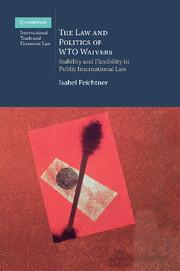Book contents
- Frontmatter
- Contents
- Acknowledgements
- 1 Why study the WTO waiver?
- Part I The stability/flexibility challenge in public international law and particularly the WTO
- Part II The practice and law of waivers
- Part III The potential of waivers to address the stability/flexibility challenge in international law
- Bibliography
- Index
Part III - The potential of waivers to address the stability/flexibility challenge in international law
Published online by Cambridge University Press: 05 December 2011
- Frontmatter
- Contents
- Acknowledgements
- 1 Why study the WTO waiver?
- Part I The stability/flexibility challenge in public international law and particularly the WTO
- Part II The practice and law of waivers
- Part III The potential of waivers to address the stability/flexibility challenge in international law
- Bibliography
- Index
Summary
The potential of waivers to address the stability/flexibility challenge in international law
The previous part focused on the waiver power of the GATT 1947 and the WTO Agreement, the waiver practice and the rules governing the exercise of the waiver power. Chapter 4 revealed that the political organs exercised the waiver power to address a number of the flexibility challenges identified in Part I. Waiver decisions were adopted to take account of capacity problems to implement legal norms, to accommodate policy preferences, to coordinate WTO law with the law of other international regimes and to adapt legal rules to claims of inadequacy and injustice by the membership. Chapter 6 now attempts to situate the waiver power within the broader framework of legal mechanisms that flexibilize international treaty regimes in order to promote acceptability and effectiveness, as well as legitimacy. I shall compare the waiver power to these mechanisms in order to identify its specific potential. Since the extent and realization of this potential in great part depends on the decision-making process, I shall come back to this process – which was already the subject of the last chapter – in Chapter 7.
- Type
- Chapter
- Information
- The Law and Politics of WTO WaiversStability and Flexibility in Public International Law, pp. 275Publisher: Cambridge University PressPrint publication year: 2011

